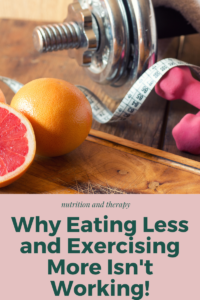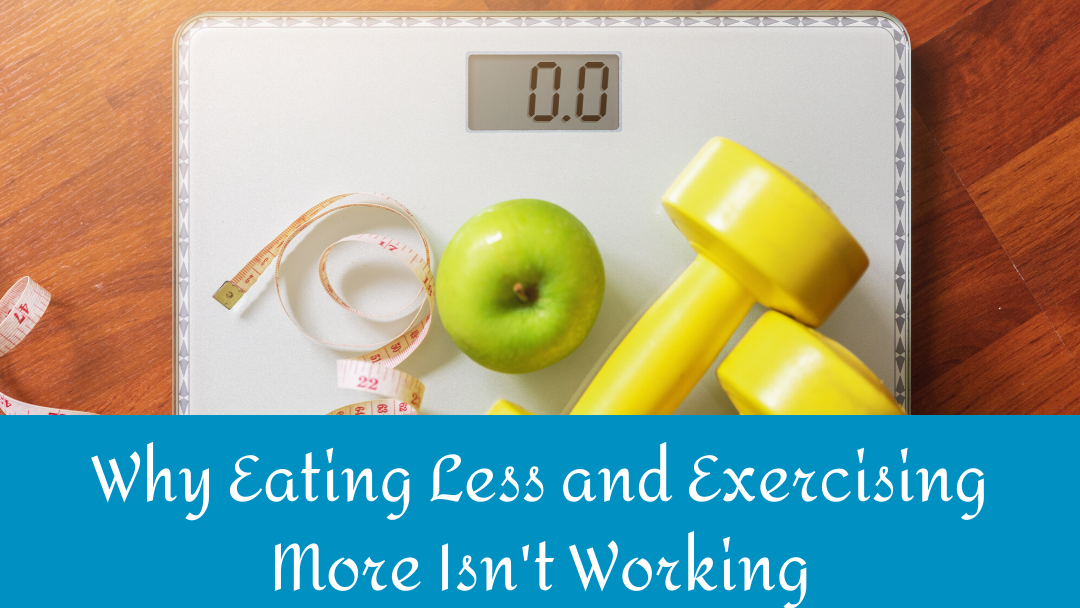If you’re on a mission to lose weight, for whatever reason, you may be tempted to try the ages old recommendation of eating less and exercising more. Keep reading to find out why this tactic often backfires.
Calorie Defecit
It is true that for any weight loss to occur, our bodies need to have a calorie deficit. The problem with eating less or moving more to obtain this is that we are very much oversimplifying the process and assuming that we can easily control how our body metabolizes what we eat.
Our metabolism, or the process of turning what we eat into energy, is influenced by more than what or how much we eat and how much we move. In addition, the idea that the more we can cut back our intake or the more we can expend through exercise will lead to a bigger weight loss often leads to a slow metabolism, not a quicker one. Slower metabolism equals less weight loss or even weight gain.
Most people who want to lose weight, hope that the weight lost is in the form of fat loss. When we under eat and over exercise we increase the chances that we will lose muscle as well as (or in place of) fat. Fueling properly for our movement and lifestyle is essential for muscle preservation and/or gain.
What Influences Our Metabolism
What and How Much We Eat
While eating much more than our bodies need to operate and fuel our activities can lead to weight gain, eating too little can end with the same result. To fuel our bodies, repair our muscles, replenish energy stores, and thrive in our daily life, we need to properly fuel with food.
Our metabolism can increase or decrease depending on the food we feed it and the food it anticipates having in the future (based on previous experiences). We’ll get into this more in the section below.
Movement
Exercise and movement of our bodies of any kind has the ability to increase our metabolic rate. Aerobic exercise, or cardio style workouts, can increase the amount of calories you burn, but too much of this exercise can often backfire, increasing cortisol levels, and causing muscle breakdown.
Strength training helps to build up muscle tissue, which can increase our metabolic rate by increasing muscle mass, which uses more energy than fat tissues.
Stress Levels
Whether it is emotional or physical, stress plays a big part in our bodies health and metabolism. Chronic stress causes us to live in a state of fight or flight, which increases the levels of cortisol in our body. Cortisol slows down metabolism to conserve energy from less important tasks so that we can deal with the stressful situation at hand.
When the stress response is activated our body has no way of knowing whether we need to run from a tiger or just haven’t had enough sleep. Cortisol is released in both cases.
Hormones
In addition to cortisol, there are other hormones that can play a part in determining your metabolic rate. If you struggle with a thyroid condition or PCOS, your hormones are likely influencing your metabolism and your weight.
The relationship between hormones and metabolism can also be connected to gaining weight as we age. Estrogen is a hormone that can influence weight gain and weight distribution. As we approach menopause our estrogen levels decrease, often leading to a decrease in metabolism and an increase in fat storage in the area around our abdomen.
Body Composition
Muscle tissue burns more energy than fat cells. One of the reasons men often lose weight faster, or have a higher metabolism than women, is because of the difference in body composition. Women have an average of 6-11% higher body fat than men related to differences in hormones and the evolutionary needs our our bodies.
Genetics
Even without considering any of the above reasons, some people are genetically wired to have faster or slower metabolisms.
While nutrition and exercise do play a major role in how we lose, maintain, or gain weight, you can see it’s not the only factors at play. Our genes, hormones, stress levels, and body composition are either out of our control or dependent on lifestyle choices other than eating and moving.

Eating Too Little And Exercising Too Much Results in a Slower Metabolism
When we undereat, or go too long without eating, our bodies react by slowing down our metabolism to conserve the energy we have. Some studies suggest that under eating can result in up to a 23% decrease in metabolism. This slower metabolism can stick around long after the diet is over, leading to quick weight gain once intake is increased.
In our world today, we see this as a burden, but our bodies see it as a necessary survival skill. When we consider that it wasn’t long ago (from an evolutionary standpoint) that we were withstanding frequent famines or had to expend a lot of energy to hunt or gather our food, it makes perfect sense.
When we purposefully eat minimal calories or go long periods without eating we are training our bodies to prepare for the next famine. This means that when food is available, our body will do its best to store and conserve that energy to survive the next starvation period.
These results can have a lasting impact as well. The popular TV show The Biggest Loser ran a study on contestants. During the show, select contestants lost an average of 128 pounds. Six years later they had regained an average of 90 pounds.
We know that body composition plays a part in metabolism, so it makes sense that before the show their basal metabolic rate (calories burned at rest) was higher (2,607kcal/day) than at the show’s end (2000kcal/day).
Six years later when their weight had increased by 90 pounds, their basal metabolic rate had dropped even further (1900 kcal/day) despite having gained the weight back.
This is a great example of how following low calorie diets can harm us in the long run, and decrease our metabolism long after the “diet” is over.
How to Find Your Balance
We know that focusing on weight is not a good way to improve health and wellness in the long term. Making a plan that will work for you, your body, and your lifestyle is the best way to make healthier habits stick.
When it comes to movement and exercise, find a balance of aerobic and strength training that works for you, is fun, and leaves you feeling energized, not drained.
Working with a dietitian/ certified dietitian nutrition coach to develop a plan to help you enjoyably fuel your body the way it needs can be an essential part of your health and wellness journey.
Did you find this article helpful? Read to learn more about Set Point Theory and 7 ways to include self care in every day.








